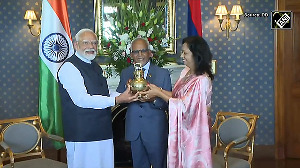Commodity futures market's dream run came to a halt in 2013 as a Rs 5,600 crore (Rs 56 billion) scam in Jignesh Shah-led spot exchange NSEL and imposition of transaction tax on non-farm items hampered the growth of business, with turnover estimated to dip by 30 per cent to Rs 125 lakh crore (Rs 125 trillion). The year began with Finance Minister P Chidambaram imposing 0.01 per cent commodity transaction tax (CTT) in Budget on non-agri products and processed food items, a development that did not go well with the industry.
The year began with Finance Minister P Chidambaram imposing 0.01 per cent commodity transaction tax (CTT) in Budget on non-agri products and processed food items, a development that did not go well with the industry.
The tax that came into force from July 1, affected the trading volume in 21 commodity futures exchanges including the two largest bourses MCX and NCDEX.
July was also eventful as a big scam at the unregulated National Spot Exchange Ltd (NSEL) came in the public glare during this month tarnishing the image of decade-old futures market.
The Centre, which had issued a show-cause notice to the NSEL last year for running a forward contracts in violation of law, finally suspended trading at the spot exchange that unearthed a fraud of mammoth nearly Rs 5,600 crore (Rs 56 billion) - even bigger than Harshad Mehta security market scam.
As many as 24 NSEL members (buyers) owe this amount to 13,000 investors with no stock in warehouses as collateral. So far, about Rs 265 crore (Rs 2.65 billion) has been paid to investors with NSEL defaulting for the 18th time in a row in its weekly payment.
Series of events that unfolded after the ban shook the investors confidence in the commodity markets as multi-agencies probe found out irregularities at NSEL leading to arrest of top officials including its MD and CEO Anjani Sinha.
Nature and magnitude of scam was such that the Consumer Affairs Ministry did not have wherewithal to probe this matter and regulator Forward Market Commission (FMC) was transferred to the finance ministry for overseeing the enquiry.
Jignesh Shah, who was on a high at the start of this year with government's permission to start stock exchange, could not escape responsibility for this huge payment crisis and had to resign from two exchanges - MCX and MCX-SX - that he founded and nurtured.
He has virtually lost control over both these bourses with regulators FMC and SEBI appointing their nominees on board.
At the fag end of the year, Shah received another jolt when FMC declared him and his firm FTIL unfit to run any exchange in the country.
Facing charge of being the ‘highest beneficiary’ in the scam, Shah has challenged this order in the Bombay High Court, which will hear the matter early next year.
"Investors confidence was at an all-time low in 2013," said a analysts with a major brokerage firm while referring to the adverse impact of NSEL scam and imposition of CTT.
"Returns from the commodities market was lower as compared to the equity markets. Gold, silver and a few agri-commodities performed badly in the year," brokerage firm SMC Comtrade Chairman and Managing Director D K Aggarwal said.
Controversies were not limited to MCX and its group firm FTIL alone and two other bourses, the National Commodity & Derivatives Exchange Limited (NCDEX) and National Multi Commodity Exchange of India Ltd (NMCE) also had their share during the year.
Kailash Gupta, who pioneered the first electronic bourse NMCE in India in 2003, was arrested for alleged multi-crore fraud. He was charged with abusing his position to favour family -run companies. NCDEX was dragged into court by traders for alleged delivery of poor quality pepper.
Concerned over these issues, FMC has taken number of steps to boost the markets confidence and ensure that NSEL like scam does not get replicated in future exchanges.
Major reforms taken by FMC included mandatory registration of warehouses by bourses under the Warehousing Development Regulatory Authority (WDRA), banning exchanges from offering portfolio management services (PMS) and tightening guidelines for appointment of Board members.
The only positive sign in the market was launch of sixth national commodity bourse Universal Commodity Exchange (UCX) in April but the bourse has received lukewarm response due to CTT and negative sentiment after NSEL fiasco.
The negative sentiments got reflected in the business with combined turnover of all commodity exchanges estimated to fall by 30 per cent to Rs 125 lakh crore (Rs 125 trillion) in 2013 calendar year from nearly Rs 175 lakh crore (Rs 175 trillion) last year. The turnover at all 21 bourses remained sluggish during the year.
The year 2013 would remain an unforgettable year and in fact a black spot in the history of Indian commodity markets due to the NSEL scam. However, the market players and brokerage firms are of the view that reforms being undertaken by FMC is expected to provide a firm ground for revival of the market in 2014.
Stating that the year was "challenging" for the industry, NCDEX CEO and Managing Director Samir Shah said, "I think the regulator has done a remarkable job in handling the NSEL crisis and at the same initiating steps for market reform and market development."






 © 2025
© 2025